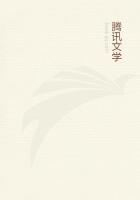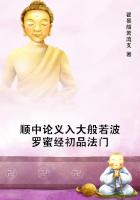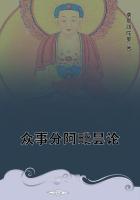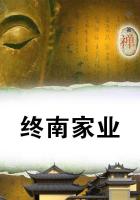"Now and then this rivalry between the two young Parisians would drop into a hand-to-hand fight. I myself was witness to such a skirmish one day, in front of 'La Prunelle.' The rivals pulled each other's hair mightily while the manuscripts flew about over the pavement, and Virginie, in her short skirts, stood at the door of the cafe and laughed until she seemed about to shake to pieces.
"Pierre was the strongest, and Adolphe came off with a bloody nose.
He gathered up his manuscripts in grim silence and left the battlefield and the still laughing Virginie with an expression of deep anger on his wounded face.
"The following day, when I teased him a little because of his defeat, he smiled a sly smile and remarked:
"'Yes, but I won a franc from him, the big stupid animal. And so it was I, after all, who took Virginie out that evening. We went to the Cafe "Neant," where I let them put me in the coffin and pretend to be decaying, to amuse her. She thought it was lots of fun.'
"One morning Lucien had come for me as usual, put me on the divan, and seated himself at his writing table. He was just putting the last words to his novel, and the table was entirely covered with the scattered leaves, closely written. I could just see his neck as he sat there, a thin-sinewed, expressive neck. He bent over his work, blind and deaf for anything else. I lay there and gazed out over the tops of the trees in the park up into the blue summer sky.
The window on the left side of the desk stood wide open, for it was a warm and sultry day. I sipped my whisky slowly. The air was heavy, and thunder threatened in the distance. After a little while the clouds gathered together, heavy, low-hanging, copper-hued, real thunder clouds, and the trees in the park rustled softly. The air was stifling, and lay heavy as lead on my breast.
"'Lucien!'
"Lucien did not hear or see anything, his pen flew over the paper.
"I fell hack lazily on my divan.
"Then, suddenly, there was a mighty tumult. A strong gust of wind swept through the street, bending the trees in the gardens quite out of my horizon. With a crash the right-hand window in the balcony flew wide open, and like a cyclone, the wind swept through, clearing the table in an instant of all the loose sheets of paper that had lain scattered about it.
"'The devil! Why don't you shut the window!' I cried, springing up from the sofa.
"'Spare your energy, it's too late,' said Lucien with a gentle mockery in his soft voice. 'Look there!'--he pointed out into the street, where his sheets of paper went swirling about in the heavy air like white doves.
"A second later came the rain, a veritable cloud-burst. We shut the windows and gave ourselves up to melancholy thoughts about the lost manuscript, the recovery of which now seemed utterly hopeless.
"'That's one thousand francs, at least, that the wind has robbed me of,' sighed Lucien. 'Well, enfin, that doesn't matter so much.
But do you know anything more tiresome than to work over the same subject a second time? I can't think of doing it. It would fairly make me sick to try it.'
"We were in a sad mood that morning. When we went out to breakfast at about two o'clock, we looked about for some traces of the lost manuscript.
"There was nothing to be seen. It had vanished completely, whirled off to all four corners of the earth probably, this manuscript from which Lucien had expected so much. Truly it was 'The Force of the Wind.'
. . . . .
"Now comes the strange part of the story. One morning, two weeks later, Lucien stood in the door of my little room, pale as a ghost.
He had a bundle of printer's proofs in his hand, and held them out to me without a word.
"I looked at it and read:
"'"The Force of the Wind," by Lucien F.'
"It was a good bundle of proofs, the entire first proofs of Lucien's novel, that novel the manuscript of which we had seen blown out of the balcony window and whirled away by the winds.
"'My dear man,' I exclaimed, as I handed him back the proofs. 'You HAVE been industrious indeed, to write your entire novel over again in so short a time--and to have proofs already--'
"Lucien did not answer. He stood silent, staring at me with a weird look in his otherwise so sensible eyes. After a moment he stammered:
"'I did not write the novel over again. I have not touched a pen since the day the manuscript blew out of the window.'
"'Are you a sleep-walker, Lucien?'
"'Why do you ask?'
"'Why, that would be the only natural explanation. They say we can do a great many things in sleep, of which we know nothing when we wake. I've heard queer stories of that. Men have committed murders in their sleep. It happens quite often that sleep-walkers write letters in a handwriting they do not recognize when awake.'
"'I have never been a sleep-walker,' answered Lucien.
"'Oh, you never can tell,' I remarked. 'Would you rather explain it as magic? Or as the work of fairies? Or do you believe in ghosts? Your muse has fascinated you, you mystic!' And I laughed and trilled a line from 'The Mascot,' which we had seen the evening before at the Lyric.
"But my merriment did not seem to strike an answering note in Lucien. He turned from me in silence, and with an offended expression took his hat and his proofs, and--humorist and skeptic as he was ordinarily, he parted from me with the words, uttered in a theatrical tone:
"'There are more things in heaven and earth than are dreamed of in thy philosophy.'
"He turned on his heel and left the room.
"To be candid, I was unpleasantly affected by the little scene. Icould not for an instant doubt Lucien's honesty,--he was so pale, so frightened almost--so touching in the alarm and excitement of his soul. Of course the only explanation that I could see was that he had written his novel in a sleep-walking state.
"For certainly no printer could set up type from a manuscript that did not exist,--to say nothing of printing it and sending out proofs.

